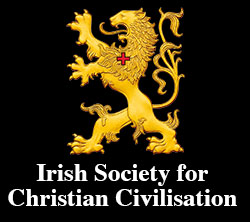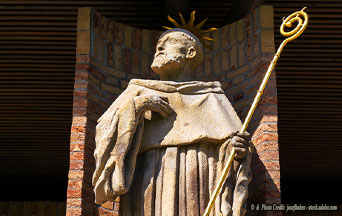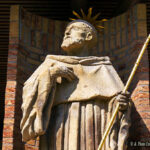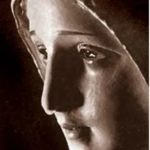By Plinio Corrêa de Oliveira

According to the habits of Catholic piety, Friday is dedicated to the Passion of Our Lord Jesus Christ. This fact is understandable because He died on a Friday.
Sunday is dedicated to the resurrection of Our Lord Jesus Christ. That is also understandable: He resurrected on a Sunday.
Between Friday and Sunday there is Saturday. That day brings with it a sad rather than cheerful connotation because the Sabbath was the day consecrated to the Lord in the old synagogue. It was God’s day, the day when creation had been completed.
Modesty: An Effective Way to Defend the Family
The Sabbath ceased being a holy day from the time the synagogue was extinguished and relegated to a situation of disgrace in which it lost its covenant with God.
How should Catholic piety fill Saturday, a day placed between two other exalted days?
As we all know, Saturday is dedicated to Our Lady.
Why is Saturday dedicated to Our Lady? Why, for example, were the first Saturdays of the month chosen for the communion of reparation? What are the profound reasons for this Catholic custom of dedicating Saturday to Our Lady?
The reason has been found in documentation from the Abbey of Cluny:
“Devotion to Our Lady received a great impulse in the beginning of the tenth century with the monastic reform led by Cluny, the Order that built medieval civilisation. It was then that the habit of dedicating Saturday especially to her became widespread.”
Order of Cluny Propagates Devotion to Our Lady
“For example, Saint Hugh (Abbot of Cluny) determined that when no unmovable feast occurred on a Saturday, the Office of the Blessed Virgin Mary should be sung in all monasteries of Cluny, and the Mass “De Beata Virgine,” that is, the liturgy especially composed in her praise, should be celebrated. Pope Urban II ordered that the Little Office of Our Lady be added to the Office of the Church on Saturdays.”
This shows the impulse that the Order of Cluny gave to devotion to Our Lady, and particularly on Saturdays.
Angels Did Indeed Take the House of Our Lady to Loreto
It continues: “While there are several explanations for this custom of dedicating Saturday to Mary Most Holy, the one most widespread in Christendom that moved souls with special veneration to the Blessed Virgin was a result of the great importance the Resurrection of Our Lord Jesus Christ enjoyed in medieval spirituality.”
“The Gospels tell us that after the death of Our Lord Jesus Christ, the Apostles, disciples and holy women did not believe in the Resurrection even though Our Lord had often foretold it to them.”
“Thus, from the time Our Lord died on the Cross on Good Friday until Resurrection Sunday, only Our Lady believed in His divinity. Therefore, she alone had perfect faith, for as Saint Paul says, “Without the Resurrection our Faith would be in vain.” Therefore, on that Saturday, only Our Lady personified the Catholic Church throughout the Earth and medieval men praised her especially on that day.”
Between Good Friday and Easter Sunday only Our Lady Believes in the Resurrection
This explanation could not be more beautiful. As every Catholic knows, this fact is real. It would be exaggerated to say that the holy women and the Apostle Saint John the Evangelist, had lost their Faith, but they had no faith in the Resurrection. They had not realised it would take place even though Our Lord had repeatedly spoken of it.
The Resurrection is such a violent fact, one so contrary to the natural order of things that the human spirit is not prone to grasp it. And though Our Lord raised Lazarus from the dead and they had seen that resurrection, because of their hardened souls they failed to realise that He who had raised Lazarus would also raise Himself. They did not realise that Our Lord was going to accept the challenge that blasphemers threw at the foot of the Cross when they said to Him, “If you are the Son of God, come down from the cross and heal Thyself.”
He did much more than come down from the Cross and heal Himself: He allowed Himself to die and then raised Himself, something even more extraordinary!
It is more extraordinary to resurrect oneself than to resurrect Lazarus. For, while it is extraordinary and impossible in the order of nature for a living person to resurrect a dead one, here you still have a living person that raised a dead one. But for a dead man to resurrect himself, rise from the depths of death on his own strength by telling his soul: “Arise, enter into your body and become one with it again”! This is a kind of victory within victory, a kind of splendour within splendour that is inconceivable to the human mind.
Then one understands that even in Our Lady’s closest circle, those who surrounded her at the foot of the Cross – the Evangelist, the holy women, Nicodemus, or others who approached in that hour of bitterness and accompanied Our Lady in her extreme sorrow to her house and stayed with her – did not know that He would rise again. She knew, but they did not. They had a mysterious feeling that Our Lord’s history was not closed and the last word had not yet been said. Their presence near Our Lady clearly showed they had a clue that something was going to continue, for otherwise they would have completely dispersed. Yet, while they had this mysterious inkling that something was going to continue they had not conceived the idea of resurrection. The Gospel’s account of the attitude of Saint Mary Magdalene is clear; she did not expect Our Lord to have resurrected.
Abortion May Be Legalised but Pro-Lifers Are Alive & Kicking
During that time only Our Lady believed in the Resurrection. Therefore, on the whole face of the Earth she was the only creature that had entire Faith, a most complete Faith without the shadow of a doubt. It was an absolute certainty and immensely painful expectation because of the sin that had been committed, but she was immensely calm in the certainty of the approaching victory.
Accordingly, at every passing minute the sword of longing and pain somehow plunged even deeper into Her Immaculate Heart. But on the other hand she had certainty and great joy over the coming victory. And for her this was obviously a reason for consolation and joy.
Since on that occasion she alone represented the Faith we can say that if she had not done so, the world would have ended, for the world cannot exist without Faith. Were Faith for a moment to cease to exist in the world, Providence would put an end to it. Because of Our Lady’s admirable Faith, she alone sustained the world and gave continuity to the promises of the Gospel.
All the promises made in the Gospel and all the promises made in the Old Testament that the Messias would reign over the whole Earth and would be the King of Glory and the centre of History would not have been fulfilled if at some point the Faith had been erased and the world thus come to an end.
All that promise lived in Our Lady. She was the Ark of hope in future ages. She had in herself as in a seed all the grandeur that the Church would develop over the ages, all the virtues that she would sow, all the promises of the Old Testament, and all the accomplishments of the New. All that lived in one soul: Our Lady’s soul.
We can say that this episode in the life of Our Lady is one of the most beautiful, to the point that one can ask: Is this not more beautiful than the period when she begot Our Lord Jesus Christ in her holy womb, which was a true Tabernacle?
Which of the two occasions was the life of Our Lady most sublime: when she begot the Messias and alone carried within her the salvation of the whole world or when she had in her bosom the Holy Roman Catholic and Apostolic Church and therefore the Mystical Body of Christ.
I think it would be rash to decide this question. Someone might say, “I do not understand why you ask the question because having within oneself Our Lord is more beautiful than having the Roman Catholic Church, for Our Lord is the Head of the Church and nothing is more noble than to have His Real Presence.”
The Eucharistic Miracle of Santarem
Confidence in the Triumph of Her Immaculate Heart
French playwright Edmond Rostand, in his theatre play “Chanteclair” says that “It is at night that it is beautiful to believe in the light.”
What merit is there to believe in the light at noon? You need to be a sick man not to see the sun at midday. But believing in the light at midnight or at three o’clock in the morning, when even midnight is already far off and you have the impression that the course of things has sunk us into darkness forever, it is then that it is beautiful to believe in the light.
In that terrible midnight, in that terrible helplessness, Our Lady believed in the light and kept her Faith in its entirety! Imagine Our Lady watching Our Lord die. Humanly, every wound of His was a reason to make more indisputable the fact that He would die. And He died as Bossuet said: “broken, shattered, annihilated.”
When she had His corpse collected in to be prepared with balms and scents and taken to the grave, she held in her hands that huge physical defeat and saw all the natural impossibility of the resurrection. Yet she calmly made a resolute act of Faith saying, “All these wounds and crushing death do not matter; He will rise. I believe it because He promised.” And in that horrible night she said with all certainty: “I believe!” She had no doubt whatsoever.
While it is difficult to decide which moment was most beautiful in her life, this was definitely one of them.
Then one understands with what acumen the Church chose the day to celebrate Our Lady. It is precisely the day that reminds us of the tragic hour of doubt and abandonment.
On Friday, He died. On Saturday He was in the grave, full of perfumes and aromas, breathless, wrapped in the Hebrew fashion, a stone sealing the front of the tomb, guarded by soldiers. It was all over except in her soul, where a flame of Faith and conviction burned in the certainty that He would rise. This is Holy Saturday.
Is it not true that this day should be dedicated to Our Lady?
Is it not fair that Our Lady be considered especially blessed by all generations every Saturday until the end of the world? Here it is no longer because she begot the Son of God but because she believed in the Son of God. It is a true marvel! Thus we understand with what acumen Cluny chose this day.
This is also a reason for us to have a special devotion to Our Lady on this day. We especially venerate Our Lady on every Saturday not out of routine or a habit whose origin we do not know, but by seeing the sublime and extraordinary reason that gave rise to this habit. And we turn to Our Lady to ask her to have pity on us and help us on this day.
We would add even more: If there is a day when a faithful Catholic has the right to ask Our Lady to have pity on him, that day is Saturday.
The Exaltation of the Holy Cross
We are in the middle of the night. Were the Church not immortal one could say that the Constantinian Church has been extinguished. We have before us only devastation, corruption and misery in almost every sector of human life—if not all.
Everything appears to say that Christian Civilisation has died. There is, however, a vessel that Our Lady seeks – one of honour and glory, a vessel of chastity and fidelity in which she gathers all Catholic sensibility, all devotion to her, and entire love of all traditions that others are foolishly abandoning. In that vessel she places at the same time, the hope in, and certainty of her reign. In this terrible night the soul of a faithful Catholic is a vessel of honour and glory, purity and fidelity, continually placed before Our Lady’s gaze and receiving her blessings because it is a link between a tradition that continues and a future that will come.
The faithful Catholic believes. He is certain that in the end the Immaculate Heart of Mary will triumph. This certainty gives him tranquillity amidst the greatest misfortune – similar to the tranquillity of Our Lady on Holy Saturday.
Until the triumph of the Immaculate Heart comes we are living a great Holy Saturday in which one would say that everything we love lies in the grave without balms and in disorder, contempt, hatred and abandonment.
However, outside there are not just a couple of guards, but jailers from all over the world. We, together with Our Lady, are certain of victory. It is so reasonable for us to say:
O Immaculate, Wise and Most Faithful Heart of Mary, give me the grace to be immaculate, particularly in purity. Give me the grace to be entirely wise and thus to have an unshakeable fidelity, so that even if the world seemed to fall apart and the stars fell from the sky and the columns of the Earth cracked we would still say calmly, patiently, with dynamism, apostolic vigour and courage: “Her Immaculate Heart will triumph!”
Sign the Three Hail Mary Pledge
This year, it is more crucial than ever that we turn to prayer and intercession to increase devotion to Our Lady across our country. That’s why you’re invited to join us in the Three Hail Marys Pledge, a powerful devotion that can bring personal spiritual benefits and national transformation. By reciting three Hail Marys daily, you honour the Immaculate Heart of Mary and seek her intercession for the conversion of sinners, the salvation of souls and the restoration of Ireland’s Catholic Faith. This ancient devotion, revealed to Saint Mechtilde, promises spiritual benefits including protection from mortal sin and the assurance of a good death. Your daily prayers will contribute to an increase in devotion to Our Lady, the conversion of sinners and the moral renewal of our country. Let us commit to this powerful devotion and seek the guidance and protection of Our Lady.







Beautiful!!! I loved this article….God bless abundantly all who take this article seriously….and special blessings to Plinio C..!
All Glory be to God and His Blessed Mother
Salve Regina. Let’s all share this holy message in honour of Our Lord and Blessed Mother….this is the year of Hope.